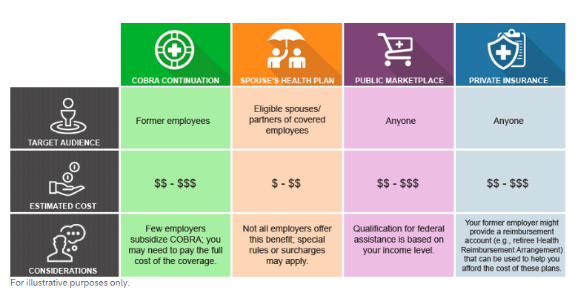 Retirement can be an exciting phase to plan for, but the age in which you retire may have a significant impact on your cash flow boiling down to one huge factor…health insurance.
Retirement can be an exciting phase to plan for, but the age in which you retire may have a significant impact on your cash flow boiling down to one huge factor…health insurance.
It’s becoming more common for people to continue working until they reach the magical age of 65, Medicare age. For some this means continuing to work longer, one spouse (if married or partnered) continuing to work longer, or both working part-time in a place that offers access to health insurance. The key to each of these scenarios is access to more affordable health insurance premiums underneath a group plan. I have seen premiums at upwards of $1,000 per month for private health insurance policies for individuals under the age of 65 with extremely high deductibles. As healthcare costs continue to rise, it’s extremely important to have a plan in place for how you will pay for it and how that cost might affect the affordability of other goals you may have in retirement.
What Health Insurance Options do I Have if I Decide to Retire Early?
There are four main avenues for accessing health insurance. This assumes you will no longer be working or working part-time somewhere that doesn’t offer group plan coverage and you don’t have access to retiree health coverage.
Graph 1

Let’s Discuss Your Options
COBRA insurance
As a former employee, you are eligible to continue your current health insurance plan for 18 months. However, your premiums will likely increase if your employer was covering a portion of that premium previously. The only exception would be if your employer offers retiree, health-plan dollars that help to offset the increased premium prior to age 65. The biggest benefit to COBRA is you get to continue your health insurance as is. There is no change in provider. People with a pre-existing condition may opt for COBRA insurance since evidence of insurability isn’t a factor.
Spouse’s health plan
If you decide to retire but your spouse (or partner) continues working for a company that provides group plan coverage with an affordable premium, this may be your best option. Retirement is considered a qualifying event that will allow your spouse to add you to their policy at any point throughout the year without having to wait for open enrollment.
Public marketplace
When you lose your employer-provided coverage, this is deemed a qualifying event for the purposes of obtaining coverage under the Affordable Care Act (ACA). The ACA is partially designed to provide income-based subsidies or credits to help offset health insurance premiums. In Minnesota, the exchange that does this is called MNSure. Depending on how low your household annual income is you may qualify for tax credits toward your monthly premium, cost-sharing reductions for medical costs or coverage through Medical Assistance.
Private insurance
Assuming your annual household income doesn’t qualify for subsidies and or credits you may be better off buying health insurance directly with an insurance carrier. The benefits and rates may be the same but a wider range of plan options may be available for individuals and families.
Prepare by Taking Action Now
If you still have time left to work there are ways in which you can plan now to help offset some of these costs later:
Contribute to your Health Savings Account
If you’re working and have a high deductible health plan that qualifies for a health savings account (HSA), this can be an extremely beneficial way to pre-fund retirement health costs. In 2019, families can contribute up to $7,000 annually to their HSA (or $3,500 for singles) plus there’s a $1,000 catch up contribution for those over the age of 55. Dollars contributed to an HSA are tax-deductible, grow tax-deferred and can be taken tax-free if used for qualifying health expenses. This is the only savings vehicle that has triple tax exemption.
Build your cash reserves
It is recommended that you have at least 3-6 months worth of expenses saved in your emergency cash reserves. If you are planning on retiring prior to age 65 it may be worthwhile to increase your savings balance to help cover premium and deductible costs later.
Use unique tax planning strategies to help qualify for credits or subsidies
Once retired, there are some strategies you can use to keep your household income low so you can, in fact, qualify for subsidies or credits to help offset your premium payments. Birchwood does a comprehensive review to determine if there are opportunities in which we can take advantage of these discounts while still providing adequate levels of income from other assets until Medicare age is reached.
Consider part-time employment somewhere that offers group coverage
It might be a good idea to start thinking about other opportunities if you’ve decided you’d like to retire from your current job and not work full time somewhere else. Though you may not necessarily continue the same level of income you’re used to, the real benefit is in keeping your health insurance premium low.
In conclusion, it’s absolutely crucial that you incorporate health insurance as a consideration when you are financially preparing for retirement, especially if you are under the age of 65. It’s important to understand the impact a high premium and high deductible policy will have on your overall financial future. Working with a financial planner, like Birchwood, that can help you work through the fine details of all of the different options will help smooth the road ahead.

Sources:
Graph 1: Fidelity, Your Bridge to Medicare, 4/24/2018, https://www.fidelity.com/viewpoints/retirement/transition-to-medicare



